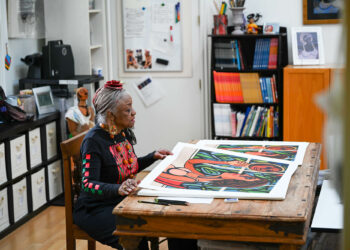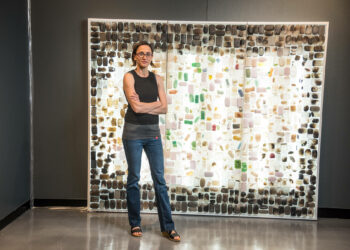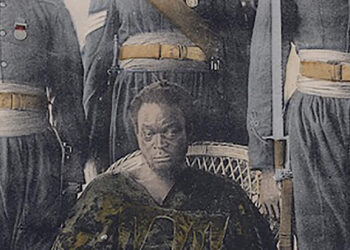Brendon Bell-Roberts, Founder & Editor of ART AFRICA, talks with Zolani Mkiva – the ‘Poet of Africa’ and appointed interim CEO of the National Arts Council of South Africa (NAC) – about his vision for the NAC and it’s relationship with the Southern African Development Community (SADC) and engagement with the corporate sector in South Africa.
 Zolani Mkiva, interim CEO of the National Arts Council of South Africa. Photographer: Andrew Brown/Cameraready
Zolani Mkiva, interim CEO of the National Arts Council of South Africa. Photographer: Andrew Brown/Cameraready
Brendon Bell-Roberts: We have seen a new look NAC emerge and much changes afoot since your appointment as interim CEO. Can you tell us about some of these developments to move the NAC towards being a game-changer in the arts and culture sector?
Zolani Mkiva: Well I think the first thing we need to do internally, is have a change of mind set – we need to understand that we live in a world that is global in character – therefore when we talk about the access to finance, we must understand that the little that we have must be used to get more funding. Creating much needed partnerships with organisations that think alike – strategic partnerships to tap into resources in kind and sometimes resources in hard cash.
So, this change in mind set is key – we ought to be creative in terms of looking into how we should support the sector, from the point of view of promotion and development. We need to move away and shift from the ‘ATM’ mentality – that the National Arts Council is only seen as a withdrawal point to support projects, and rather begin to take an active role in saying ‘what are the events that are not in the sector’ – to fill that space; by proactively filling the gaps.
We need to go province by province and say, ‘what lacks in this province?’ and then we need to make an intervention. We cannot only wait for people to bring applications to us – let’s apply our minds in terms of different kinds of strategic interventions. It ought to work both ways: the sector must inform us of its needs – but also as those who have a legislative mandate – we must identify the vacuum and close ranks. For me, that is the key thing. There is no point that in one province there is a proliferation of poetry festivals, and in another province, there is nothing. One province has comedy – another one has nothing; one province has dance theatre etc. We ought to ensure that people have equal access to all of these genres – we must create a platform as the NAC – the National Arts Council must assume centre stage and manage the national question when it comes to arts promotion and development in the country.
 Entertainment courtesy of Township Opera Company. ©Andrew Brown/Cameraready
Entertainment courtesy of Township Opera Company. ©Andrew Brown/Cameraready
You have spoken about leaning on the relationships with SADC. How does this fit into the NACs national/international strategy?
Well you know, the Arts is a major instrument of social cohesion and therefore we need to embark on exchange programmes with our neighbours in the SADC sphere. Once we have mastered that game of exchange, we go further to the broader African continent, and internationally too.
Do relationships exist for this kind of exchange at the moment?
They don’t exist – but I have taken it upon myself to establish those relations. I know that we have counter parts in the SADC regions – I don’t understand why people have not formed those formal relations and created exchange programmes with SADC and the African continent, as well as the BRICS countries. How can we tap into that and exploit those relations in favour of the arts sector? We will start with an exchange at a country level, exchange at a regional level with SADC as well as the rest of the continent – and then we go global. It is in our plans.
 FROM LEFT – RIGHT: Ralph Borland and Nkule Mabaso both recipients of NAC funding, Chief Director of Cultural Affairs Guy Redman Mr Michael Arendse from the NAC Council, Mr Moshe Apleni from the NAC Council, Ms Erica Megan Elk from the NAC Council. ©Andrew Brown/Cameraready
FROM LEFT – RIGHT: Ralph Borland and Nkule Mabaso both recipients of NAC funding, Chief Director of Cultural Affairs Guy Redman Mr Michael Arendse from the NAC Council, Mr Moshe Apleni from the NAC Council, Ms Erica Megan Elk from the NAC Council. ©Andrew Brown/Cameraready
You touched on engaging the corporate sector more strategically – which obviously makes a lot of sense. Any ideas on how this could work and what kind of instruments exist to do this?
I would like to work with the corporate world – the reason why the arts fraternity in the states [USA] enjoys fortune is because there is a lot of corporate patronage that is put towards the arts. We need to bring that kind of patronage and education when it comes to the corporate world in South Africa, so that each and every corporate in South Africa has a certain amount of money that they put towards the arts. I have been thinking about an ‘arts levy’ which we need to introduce as part and parcel of what we call ‘The Arts Transformation Charter’ – so we compel and make it fashionable for all the corporates to put some money towards arts development. The Arts require that kind of patronage – in the majority of cases, the Arts sector does not really make money, it consumes it. We need to introduce the idea of entrepreneurship. I would like to partner with the banking sector and telecommunications – I know that in our country, within their CSI strategy, they have resources that they steer towards the arts industry.
Is there any pressure that can be put on the corporates from a government point of view – in terms of policy? Perhaps convening a summit with SADC and BRICS countries that can address shared challenges and speak about it more publicly. Is this something that could help and fast track this engagement with the corporate sector?
For the most part, in the African countries, the budget that is always put forward to Arts and Culture is very little, sometimes zero. Therefore, it is important that we highlight the plights of the Arts sector by perhaps convening a national summit that can look into the issue of funding and how to encourage the governments of South Africa and Africa to have a review in so far as what they budget for the Arts and Culture sectors. The Arts play such a key role in the conscience of the nation. Through a platform [summit] of that magnitude it may help us to make a reasonable demand to governments that they ought to budget differently and not in the old way which they inherited from the colonial governments. Strangely enough – if you look at all the countries that are colonial they spend a lot of money in the arts; and the former colonies of the colonialists are still under- spending and budgeting very little. So, we need to put that challenge to the politicians of our continent to rethink the issue of relegating the arts into the background. The Arts have the power to transform society and together we should be driving the sector.



